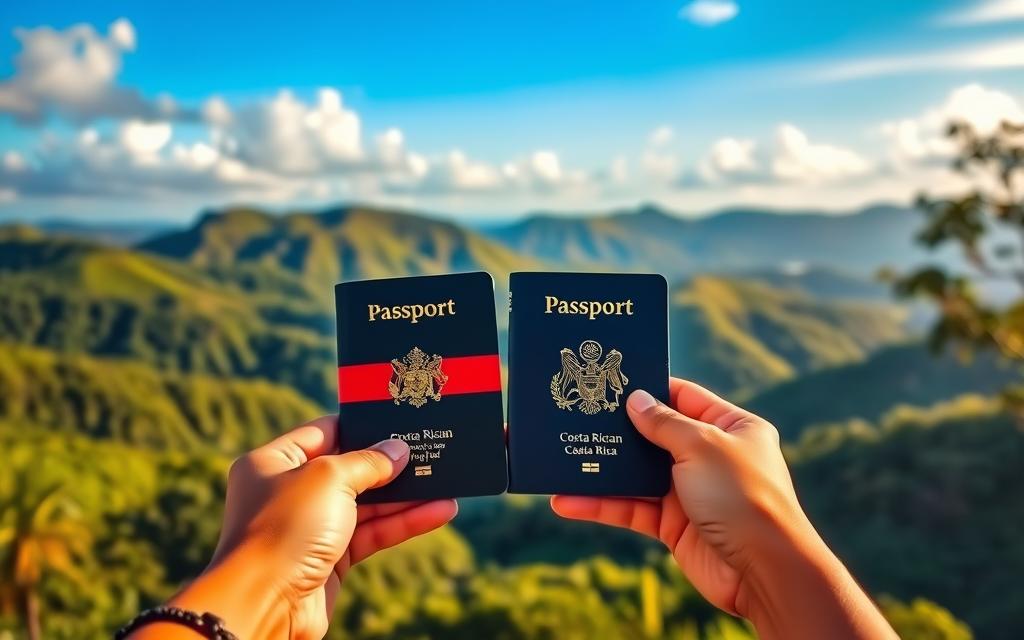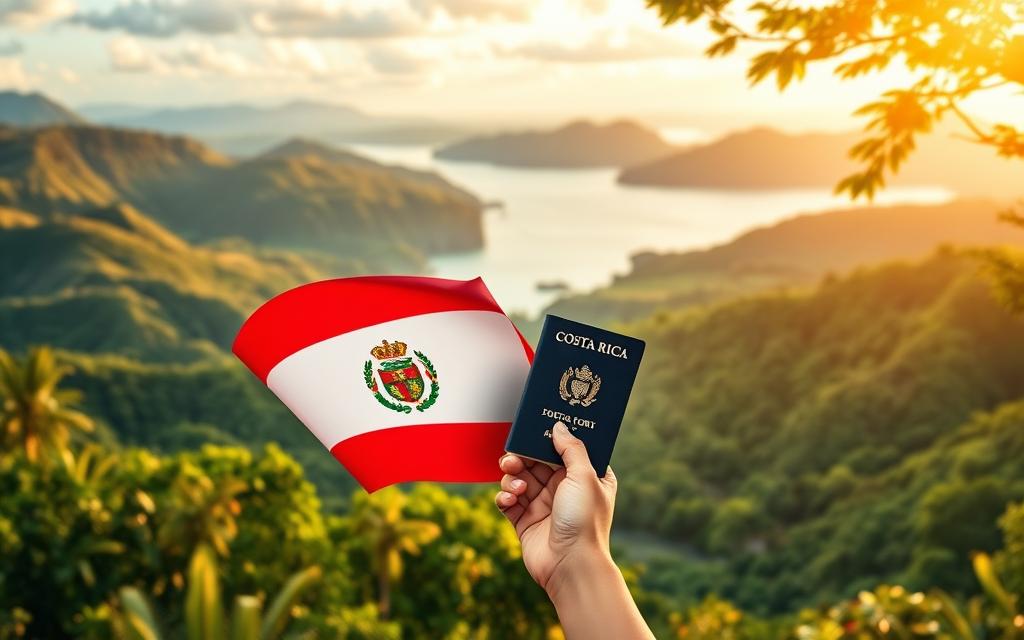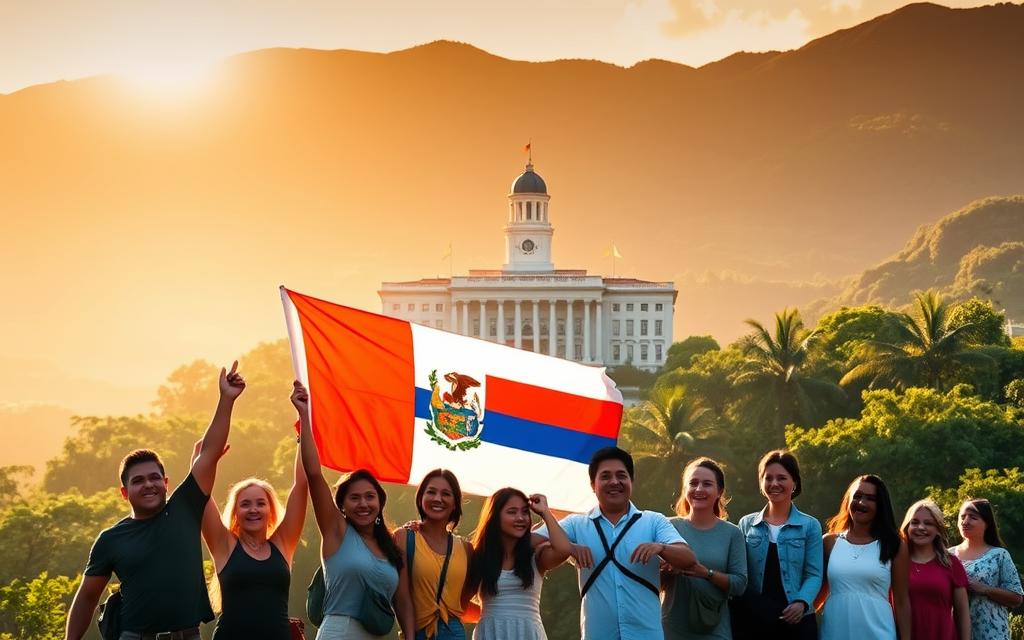Does Costa Rica Allow Dual Citizenship? We Explain

Residency in Costa Rica has become an attractive option for individuals and families seeking a better quality of life. Costa Rica permits dual citizenship, recognizing its value for individuals with ties to multiple countries.
Those who obtain a Costa Rican passport can enjoy the freedom to travel between their home country and Costa Rica without restrictions. We will explore the implications of this policy for expatriates and foreign nationals, including the pathways to obtaining Costa Rican citizenship and its benefits.
Understanding Dual Citizenship in Costa Rica

For those considering becoming Costa Rican citizens, understanding dual citizenship is crucial. Dual citizenship refers to the legal status of being a citizen of two or more countries simultaneously. This concept is particularly relevant in Costa Rica, a country that welcomes foreigners and allows them to maintain their original nationality while becoming Costa Rican citizens.
What is Dual Citizenship?
Dual citizenship is a legal status that allows an individual to be a citizen of two or more countries at the same time. This means that a person can hold multiple passports, enjoy the rights, and fulfill the responsibilities of citizenship in each respective country.
Costa Rica's Legal Position on Multiple Nationalities
Costa Rica officially recognizes dual citizenship, allowing foreign nationals to maintain their original nationality while becoming Costa Rican citizens. For more information on Costa Rica's laws regarding dual citizenship, you can visit this resource. The country's legal position on multiple nationalities is quite accommodating, reflecting its culture of peace and openness to international integration.
Pathways to Costa Rican Citizenship

Costa Rica offers multiple pathways to citizenship, catering to different backgrounds and circumstances. These pathways are designed to accommodate various needs and situations, making Costa Rica an attractive destination for individuals and families from around the world.
Overview of Citizenship Options
Costa Rica provides several routes to citizenship, including through birth, descent, marriage, and naturalization. Each pathway has its specific requirements and benefits, allowing applicants to choose the one that best suits their situation. For instance, those who have resided in Costa Rica for a certain period can apply for citizenship through naturalization.
Differences Between Residency and Citizenship
While residency allows individuals to live in Costa Rica, citizenship grants full rights and responsibilities, including the right to vote and hold public office. Residency is a stepping stone to citizenship, with various categories such as rentista, pensionado, and inversionista available to suit different needs. Understanding the differences between these statuses is crucial for those seeking to make Costa Rica their permanent home.
Who Manages the Citizenship Process in Costa Rica
The Tribunal Supremo de Elecciones oversees the citizenship process, ensuring that all applications meet the legal criteria. This body is responsible for evaluating applications, conducting interviews, and making decisions on citizenship. The thoroughness of this process reflects Costa Rica's commitment to integrating new citizens into its society.
Acquiring Citizenship Through Marriage to a Costa Rican

Costa Rica offers a unique pathway to citizenship for individuals married to a Costa Rican citizen. This route to citizenship is distinct from other naturalization processes, with its own set of requirements and benefits.
Marriage Requirements and Timeline
To be eligible for citizenship through marriage, individuals must be married to a Costa Rican citizen for at least two years and maintain residency in Costa Rica consecutively for the same duration. The residency timeline is paused when the individual leaves Costa Rica and resumes upon their return. This requirement ensures that applicants are genuinely integrated into Costa Rican society.
Documentation Needed for Marriage-Based Applications
The documentation required for marriage-based citizenship applications includes a valid marriage certificate, birth certificate, and background checks with proper authentication. Applicants must also demonstrate a genuine marital relationship, as Costa Rican authorities may verify the authenticity of the marriage. Proper preparation and documentation are key to overcoming common challenges in the marriage-based citizenship process.
By understanding the specific requirements and timelines involved, individuals can navigate the process more effectively and achieve their goal of becoming a Costa Rican citizen.
Gaining Citizenship Through Residency in Costa Rica

For those looking to make Costa Rica their home, gaining citizenship through residency is a viable option. Expatriates living in Costa Rica can apply for citizenship after meeting specific requirements, a significant step towards obtaining dual citizenship.
Residency Requirements for English vs. Spanish Speakers
The timeframe for eligibility varies based on the applicant's native language. Individuals from English-speaking countries must hold temporary or permanent residency visas for seven years, while those from Spanish-speaking countries need only five years. This distinction acknowledges the linguistic and cultural integration of Spanish-speaking individuals into Costa Rican society.
Transitioning from Temporary to Permanent Residency
Transitioning from temporary to permanent residency is a crucial step towards citizenship. Applicants must comply with residency requirements, including timely renewals and adherence to the terms of their residency category, such as rentista, pensionado, or inversionista. For a detailed guide on the citizenship process, you can refer to this resource.
Does Costa Rica Allow Dual Citizenship? The Complete Answer

For individuals considering a second passport, understanding Costa Rica's dual citizenship policy is crucial. Costa Rica permits dual citizenship, recognizing the value it brings to individuals who have ties to more than one country.
Those who obtain a Costa Rican passport can enjoy the freedom to travel between their home country and Costa Rica without facing any restrictions. This opens doors to numerous opportunities, including eligibility for a second passport.
Retaining Your Original Nationality
Costa Rican law allows new citizens to retain their original nationality without requiring renunciation of previous citizenship. This is particularly beneficial for individuals who wish to maintain their ties to their home country.
By allowing dual citizenship, Costa Rica provides its citizens with the flexibility to travel, work, and live in multiple countries, enhancing their global mobility.
Countries with Restrictions on Dual Citizenship with Costa Rica
While Costa Rica permits dual citizenship, some countries may have restrictions on their citizens holding dual citizenship with Costa Rica. It's essential to check the laws of your home country to understand any potential implications.
Countries like the United States generally allow dual citizenship, but others may have specific requirements or restrictions. Understanding these regulations is crucial to avoid any legal complications.
Required Documentation for Costa Rican Citizenship
Applicants for Costa Rican citizenship must ensure they have all the required paperwork carefully gathered. The process involves several key documents that must be prepared and submitted as part of the application.
Birth Certificates and Background Checks with Apostille
Each applicant needs to present an official Birth Certificate that's been apostilled or legalized, verifying its authenticity for use in Costa Rica. A comprehensive background check from the applicant's country of citizenship must also undergo apostille or legalization processes.
Passport Requirements and Witness Statements
Applicants are required to submit recent passport-size photographs and a valid passport with an entry stamp, demonstrating lawful entry into Costa Rica. Sworn Statements from two witnesses are also necessary, verifying the applicant's character and intentions within Costa Rica.
Spanish Translations and Power of Attorney
All documents must be officially translated into Spanish. Additionally, a Special Power of Attorney may be required, permitting legal representatives to act on behalf of applicants during certain stages of the citizenship process.
Timeline and Process for Citizenship Approval
Becoming a Costa Rican citizen requires navigating a multi-stage process that can take around ten to twelve months. This process involves several key steps, from the initial application submission to the final approval and receipt of your Costa Rican passport.
Application Submission and Initial Review
The process begins with submitting your application for citizenship with all required documentation. The Department of Immigration conducts an initial review, which typically takes two to three months. During this phase, authorities verify the documentation and check eligibility requirements.
Interview and Testing Requirements
Applicants are usually called for an interview at the Costa Rica consulate or local immigration office four to six months after submission. The interview assesses the applicant's eligibility and knowledge. Additionally, applicants must pass Spanish language and Costa Rican social studies examinations as part of the citizenship process.
Final Processing and Approval
After the interview, there's a detailed evaluation phase that takes another two to three months. Once approved, the application moves forward for final processing within the government's systems. Approval notifications are sent via email or mail from the immigration office.
Receiving Your Costa Rican Passport
Successful applicants receive instructions on obtaining their Costa Rican passport. This final step involves additional documentation and possibly an appointment. The entire process, from application to receiving the passport, typically spans ten to twelve months.
Benefits of Holding Costa Rican Citizenship
Becoming a Costa Rican citizen comes with numerous benefits that enhance your lifestyle and global mobility. As we explore the advantages, it becomes clear that this citizenship is highly desirable for those seeking freedom and flexibility.
Visa-Free Travel to Over 149 Countries
One of the most significant benefits of holding a Costa Rican passport is the ability to travel to over 149 countries either visa-free or with visa-on-arrival. This privilege not only simplifies travel planning but also opens up new destinations for both leisure and business.
With a Costa Rican passport, you can explore the world with ease, enjoying the cultural richness and diversity that many countries have to offer. This level of travel freedom is a hallmark of Costa Rica's strong international standing.
Right to Work and Live Without Restrictions
Costa Rican citizenship grants you the right to live and work in Costa Rica without the need for work permits or residency renewals. This freedom allows for a seamless integration into the local community, enabling you to fully experience the country's culture and lifestyle.
Moreover, as a citizen, you have the opportunity to own property and start businesses without the bureaucratic hurdles often faced by foreigners, thereby enhancing your economic stability and integration into society.
Cultural and Social Integration Benefits
Beyond the practical benefits, becoming a Costa Rican citizen also offers deeper cultural and social integration. Citizenship allows for full participation in the country's democratic processes, including voting in elections, thereby giving you a voice in the country's future.
Furthermore, as a citizen, you are entitled to access Costa Rica's renowned healthcare system and can fully immerse yourself in the country's vibrant culture and breathtaking natural environment, enhancing your overall quality of life.
Conclusion
In conclusion, becoming a Costa Rican citizen can be a life-changing decision, offering numerous benefits and opportunities. We've confirmed that Costa Rica allows dual citizenship, making it possible to maintain your original nationality. The various pathways to citizenship, including marriage and residency, have been outlined, along with the required documentation and timeline for the naturalization process.
For more information or assistance with your Costa Rican citizenship journey, contact JAROS CR at www.jaroscr.com, info@jaroscr.com, or +(506)7182-8969. We can guide you through the immigration and naturalization process.


